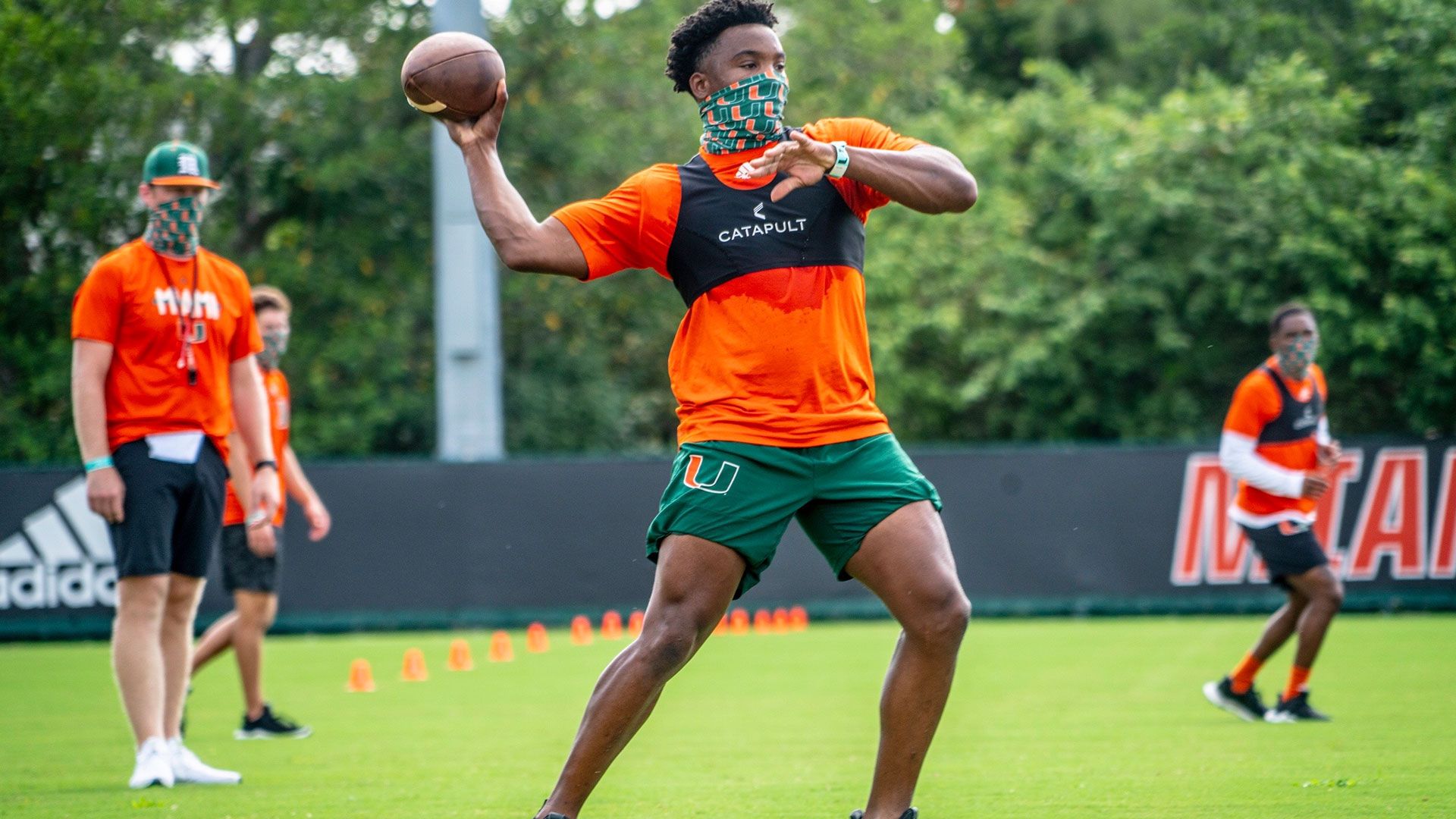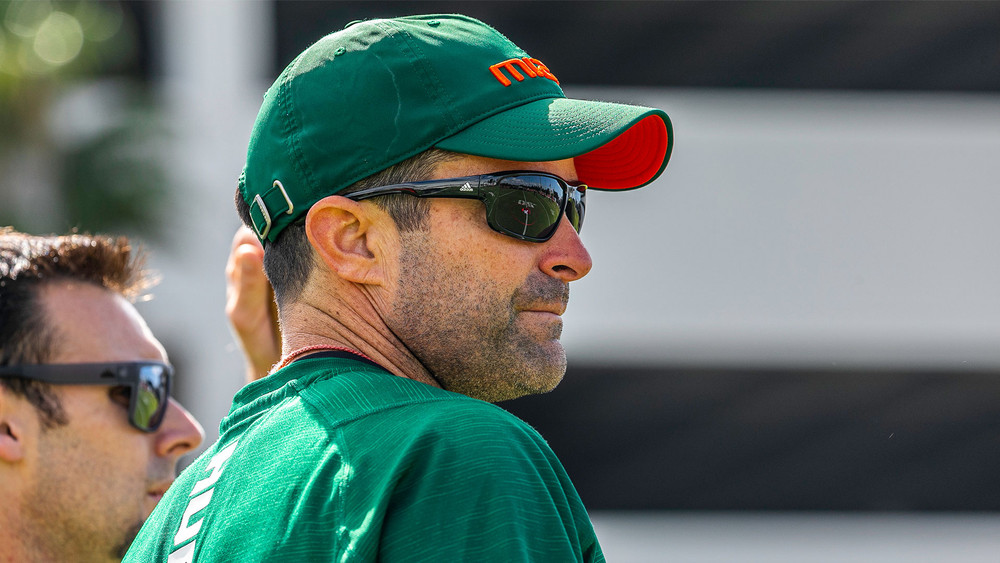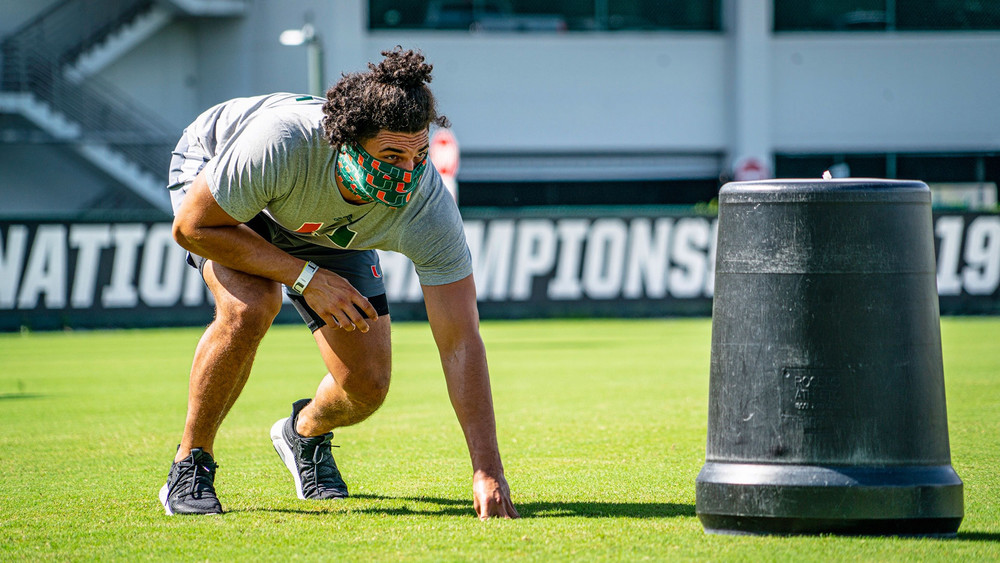
Canes Rewriting the Camp Playbook
CORAL GABLES, Fla. – How and where they stand on the sidelines between plays will be different. How they hydrate during breaks will be closely monitored. And some of the drills that have been regular parts of workouts past simply can’t happen right now.
As the Miami Hurricanes prepare to take the field Friday evening for their first practice of the 2020 season, they do so knowing the world has changed – and staying safe no longer means merely avoiding physical injuries or regulating body temperatures in the South Florida heat.
Playing a high-contact sport during a pandemic brings with it a unique set of challenges. But after months of working with health officials, team doctors, athletic trainers and Miami’s administrators, coach Manny Diaz is confident he and his staff have come up with a variety of measures that will help the Hurricanes stay healthy, while also helping them prepare to compete at a high level in the Atlantic Coast Conference.
“The sport of football is a game that involves a lot of close contact and to play football, you have to practice football. We understand our guys will be together. We’ve put clocks on that. We understand exactly how much time that is and everyone would probably be surprised at how little time, during a two-hour practice, players are in close contact with one of their teammates,” Diaz said. “The other things we can control, whether it’s individual drills, drills in the past we won’t be doing this year, the way we stand when we’re not actively participating, all of that is going to be different. And that’s the whole point – we have to control what we can control and that’s the amount of close contact that our players have.”
The field itself won’t be the only place where the Hurricanes notice changes throughout camp.
How players hydrate and eat before and after practices will be different, too, with team nutritionist Kyle Bellamy noting traditional buffet-style team meals will be replaced by healthy grab-and-go meal options. Getting to the post-practice drinks, nutrition shakes and snacks might take a few extra minutes because of social distancing protocols.
Meanwhile, associate athletic director and head athletic trainer Vinny Scavo and his staff have developed schedules and plans that regulate everything from how many football players are in the training room at any given time to how players’ individual water bottles will be stored, maintained and sanitized before, during and after practices on Greentree.
As they’ve examined every aspect of how camp will be run, Miami football staffers have had countless conversations, both with each other and with contacts in various fields across college football. They’ve conducted hours of research, with Diaz and his assistant coaches even studying practice film to measure just how many seconds players – like receivers and defensive backs – are actually in close contact on any given play.
The work and attention to detail have been needed, given not even Miami’s most veteran staffers have experienced a season like this one.
“This is unprecedented. Nobody really has a playbook for this. We’re actually creating the playbook,” Scavo said. “Everybody is working together and getting things done. … Kyle’s always in my office. [Director of Strength and Conditioning] David [Feeley] and I talk about stuff in the weight room, what they need and what they’re doing. I’m always talking to Sam [Nichols] in the equipment room and how we’re going to do things there. You have the lines of communication open. I’ve been doing this 38 years. I know I’m not the answer, but even though there’s no playbook, at least you’ve been around a long time where you know that things are going to come up and things are going to happen and you have to be prepared for all of that.”
"This is unprecedented. Nobody really has a playbook for this. We're actually creating the playbook."
Vinny Scavo, Associate Athletic Director and Head Athletic Trainer
As much work as coaches and staffers have done within Miami’s football facility, though, what happens away from the building will be key to the Hurricanes’ success, too.
That’s why educating players about the practices they’ll have to adhere to when they’re at home or in the community has been another major priority.
That, Diaz says, could ultimately be the difference in Miami’s success this fall.
“Coaches say all the time: control what you can control, right? Whether it’s in a game or anywhere. We’ve seen this virus is a formidable enemy, but there are ways to control it, there are ways to control its spread and the one thing we’ve learned as a country is that when those ways are not taken seriously, it runs wild,” Diaz said. “It’s hard enough to fight doing everything the right way, but you are really counting on your teammates to join in doing things the right way. The team that’s responsible, the team that can handle a break in routine will be successful. This is a different year. The way you travel might be different. The games might be different, the sidelines, the stands, and the teams that [don’t] worry about the external things and keep the main thing the main thing is going to have a great chance this year.”
Added Hurricanes defensive coordinator Blake Baker, “I think the team that can adjust and adapt and protect the program the best will have the best chance of winning. What I mean by that is we’ve preached to our kids of trying to form our own bubble. You see how much success the NBA is having right now, and obviously they have their own bubble, but as much as we can, [we want to] protect our kids and help them make smart decisions off the field and when they’re around someone outside the program. Really practice social distancing, wear a mask, all those good things that go into it. We’re going to have to be fluid. Every team in the country is going to have to be fluid. And the teams that are the most fluid and can adapt and adjust the best are probably going to have the most success this season.”
So while technically, the first practice of the season will come Friday night, efforts to prepare to prepare the Hurricanes for all they might encounter this fall have been going on for months.
There was no full, traditional spring practice. No spring game. For a time, players and coaches were scattered across the country, meeting virtually and doing their own workouts at home while Miami’s campus was closed. Until a day ago, the Hurricanes didn’t even know what their schedule would look like.
It’s been a stretch that has taught them all, Diaz says, to not take the game for granted.
That, in and of itself, will likely impact how the Hurricanes practice, too.
“It’s going to be extraordinarily different, but I think the overriding sentiment right now is just gratitude. Practice wasn’t guaranteed to us,” Diaz said. “We’ve had football taken away. We’ve seen professional sports start to slowly come back, so I think our players and staff are just excited because this was not promised to us. We’re just eager to get back on the field because of that.”








